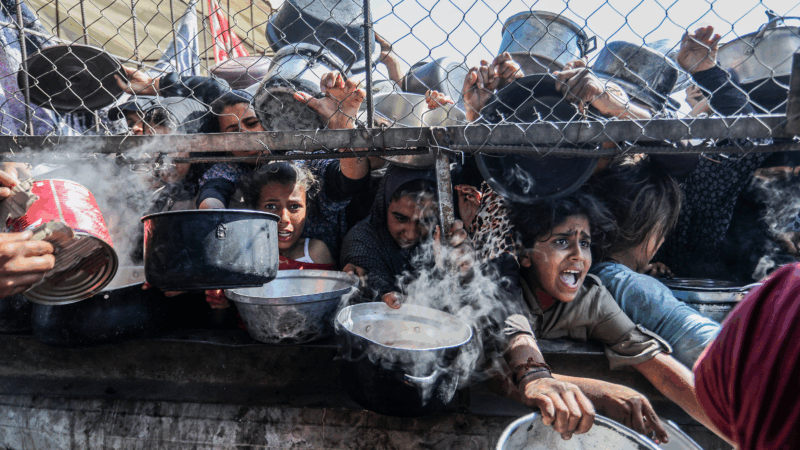Food for Gaza decays in Jordan warehouses as Israel restricts aid
AMMAN, Jordan — The main warehouse of UNRWA, the United Nations Palestinian refugee agency, is stacked high with tens of thousands of cardboard boxes packed with food meant to avert malnutrition in Gaza. Prevented by Israel since March from entering Gaza, some of it is going bad.
“Some of the food we have is arriving at expiration in July,” said Jonathan Fowler, an UNRWA spokesperson. That includes 200,000 metric tons of flour. And while some will be distributed if needed to Palestinian refugees in Jordan, “some of it will have to be dumped,” he says.
He pulls out Turkish chickpeas from a box that also includes packages of yeast, lentils, canned fish and sugar. The tens of thousands of boxes are calibrated for balanced meals and enough to feed 200,000 people for a month. All are moldering in warehouses along with even bigger quantities of food and medicine loaded on trucks that have now waited for months at Israeli border crossings.
The United States and U.S. military helped establish Jordan as the main hub for humanitarian aid to Gaza after the war between Israel and the militant group Hamas started in 2023. The kingdom is a U.S. security ally which made peace with Israel decades ago, and the Gaza border is just three hours’ drive from Jordan.
In the face of increasing malnutrition in Gaza, Israel this week debuted a new mechanism to deliver limited amounts of aid to a small number of locations located in the south of Gaza. And U.N. officials say Israel has made it clear to them that it will no longer allow in aid from Jordan or neighboring Egypt.
“One of the restrictions this last week has been to only bring in goods from Israel,” said Jonathan Whittall, head of the U.N.’s Office for Humanitarian Affairs in Gaza. “We haven’t been able to bring our goods from Egypt and from Jordan, which has limited on the medical side specifically, what we can bring in and how quickly.”
Hundreds of millions of dollars’ worth of goods stranded
The move leaves humanitarian goods valued by aid officials in the hundreds of millions of dollars stranded in overheated warehouses and at border crossings. Many of the aid organizations are now paying monthly storage fees for the supplies obtained through public and private donations.
Israel has alleged that Hamas was stealing aid. The U.N. — including Cindy McCain, a former U.S. ambassador and now the head of the World Food Program — along with other aid officials say Israel produced no evidence of systematic diversion of aid by Hamas. Many of the groups use proven distribution systems within Gaza built over decades.
The new aid organization, called the Gaza Humanitarian Foundation, has been widely criticized by aid officials. Few details about how the group is financed, or who works for it, have been made public.
“When you have armed personnel manning humanitarian sites, and you have people desperately hungry and in need of aid and not enough aid to meet the need, that’s a very volatile combination,” said Sean Carroll, president and CEO of ANERA, the biggest U.S.-based nongovernmental aid group operating in Gaza.
The first head of GHF, Jake Wood, resigned last Sunday, saying the organization was unable to operate according to humanitarian principles.
Carroll says aid groups have a combined total of more than 10 million meals waiting in trucks at Israel’s Kerem Shalom border crossing with Gaza. Some are actually on the Gaza side but prevented by Israel from going further. Israel has blamed the United Nations for not picking it up and distributing it.
GHF’s food distribution requires Palestinians in Gaza to travel to one of only a handful of access points in the south of Gaza, in contrast to aid groups that used a variety of distribution methods to deliver food throughout communities. The halt in aid shipments into Gaza has severely curtailed that.
“We’ve continued to make meals and deliver them, but instead of 100,000 to 150,000 a day, we’ve been doing 1,000 or 2,000 a day,” Carroll says.
Medical supplies are at risk too
UNRWA, established after the 1948 creation of Israel to care for 700,000 Palestinian refugees forced to flee their homes by war, is the primary provider of primary health care in Gaza. Fowler said their stocks of medical supplies, including basic items such as burn ointments, had been cut to half of needed supplies in the last two months.
Rachel Norris, Gaza director for Doctors Without Borders, which operates emergency and other health care facilities, said the months-long ban on aid shipments has left them rationing items like antiseptics, gauze, gloves and painkillers.
“Not only have all our trucks in Jordan gone through the right approval processes but now they’ve been sitting for so long we are worried that some stock will expire,” she said.
“Even the most very basic medical supplies that are critical when we’re doing wound care and surgery are missing,” she said by video call from Gaza. “You know it’s heartbreaking when I’m in the hospital like I was today and you see children in agony.”
The Israeli military agency overseeing access at the Gaza border told NPR it had no details on restrictions on aid from Jordan and Egypt.
A State Department spokesperson, when asked about U.N. and aid group comments that Israel was barring aid from Jordan and Egypt, said the reports were “absolutely false.” The spokesperson insisted on remaining anonymous in line with department policy.
Aid groups say aside from the ban on all aid currently stored in Jordan and Egypt is the cumulative effect of Israel’s rejection of items it considers of possible military use, such as water treatment chemicals.
Transcript:
STEVE INSKEEP, HOST:
Jordan has been a hub for humanitarian aid going to Gaza. There are several reasons for this. The kingdom has a peace treaty with Israel, it’s a key ally of the United States and it’s also just a few hours’ drive from the Gaza border. All of that made it a useful place from which to stage supplies, supplies that Israel no longer allows to pass into Gaza. NPR’s Jane Arraf reports.
(SOUNDBITE OF VEHICLES HONKING)
JANE ARRAF, BYLINE: In an industrial area on the outskirts of the Jordanian capital, warehouses for the U.N. agency for Palestinian refugees – UNRWA – are packed to the rafters. But there’s nothing going in or out. Israel banned all aid from entering Gaza starting in March. It says aid was being stolen by the militant group Hamas, although the U.N. and other aid groups say there was no widespread diversion. So just a few hours’ drive from the Gaza border, $24 million worth of aid has been stranded at these UNRWA warehouses for months.
JONATHAN FOWLER: We’re looking at boxes of food here, which have been sitting here, you know, in some cases since January. And unfortunately, their expiry dates are starting to approach.
ARRAF: That’s Jonathan Fowler with UNRWA in Jordan.
FOWLER: Some of the food, you know, were arriving at expiration in July. Flour – you know, we have a quantity of flour here, which is due to expire.
ARRAF: Two hundred thousand tons of flour, in fact. While some of the other food can potentially be distributed to refugees within Jordan, the flour would likely be dumped.
(SOUNDBITE OF PACKAGE RUSTLING)
ARRAF: Fowler opens up one of the cardboard boxes. There are lentils, canned fish, chickpeas. And they’re similar to more than 100 million meals other aid organizations say they have stuck on the Israeli-Gaza border. Israel cites security reasons for barring aid but doesn’t give details. In the meantime, hundreds of millions of dollars’ worth of aid paid for through public and private donations molders in storage. This week, Israel implemented a new U.S.-backed aid plan involving military contractors and delivering limited amounts of food in just four locations.
SEAN CARROLL: When you have armed personnel manning humanitarian sites and you have people desperately hungry and in need of aid and not enough aid to meet the need, that’s a very volatile combination.
ARRAF: That’s Sean Carroll, president of Anera, the biggest U.S.-based nongovernmental aid group. Now much of Anera’s food is sitting in trucks on the Gaza border. Inside Gaza, even basic supplies like painkillers have run out, says Rachel Norris (ph), a director at Doctors Without Borders. We reached her in Gaza.
RACHEL NORRIS: You know, it’s heartbreaking when I’m in the hospital, like I was today, and you see children in agony.
ARRAF: The Israeli military, asked about the restrictions on aid from Jordan and Egypt, said it had no details. A U.S. State Department spokesperson, speaking anonymously, in line with policy, said reports that Israel was barring aid from Jordan or Egypt were absolutely false.
(SOUNDBITE OF METAL CLANGING)
ARRAF: In Amman, a truck outside the UNRWA warehouse was loaded with boxes of mattresses. U.N. staff said it was sent back from the border months ago. Israel didn’t explain why.
Jane Arraf, NPR News, Amman.
(SOUNDBITE OF FLAWED MANGOES’ “RUN ON SENTENCE (ACOUSTIC)”)
See the full list of 2026 Oscar nominations
Horror movie Sinners has a record 16 nominations this year, including for best picture, actor Michael B. Jordan and a new category: achievement in casting.
Jack Smith to defend Trump investigations to House Republicans
Jack Smith's appearance before the House Judiciary Committee marks the first open testimony about his work after presiding over two federal criminal indictments of President Trump.
Rahm Emanuel steers a course between ‘monopolists’ and ‘Marxists’
NPR's Steve Inskeep speaks with longtime Democrat Rahm Emanuel about politics in the Trump era.
Trump vs. U.S. allies: How will this end?
The president has backed off his threat to take Greenland by force. But his highly inflammatory remarks in Switzerland rattled U.S. allies and threatened to tear down the pillars of the world order.
Some voters who backed Trump say ICE is going ‘too far’
A new focus group of Biden-to-Trump voters weighs in on immigration operations and Trump's foreign affairs leadership on Greenland and Venezuela.
The ICE surge is fueling fear and anxiety among Twin Cities children
Some families aren't leaving their homes as aggressive ICE operations continue in Minnesota, leaving their children confined and stressed. Across the Twin Cities, kids are anxious and afraid.






